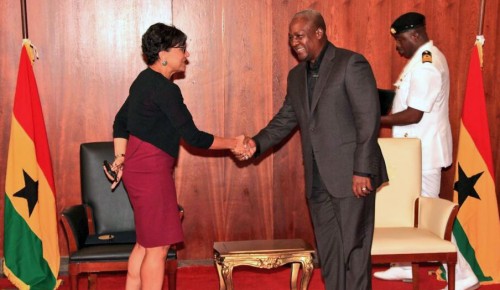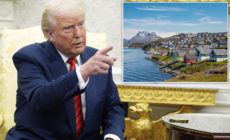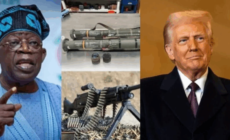US to boost energy sector
- Posted on
- Comment
 Several new interventions from the United States government and that country’s private sector are set to give Ghana’s flagging economy a major boost. Indeed there are already signs of renewed investor interest, following deliberations at the just ended United States (US) Africa Leaders Summit.
Several new interventions from the United States government and that country’s private sector are set to give Ghana’s flagging economy a major boost. Indeed there are already signs of renewed investor interest, following deliberations at the just ended United States (US) Africa Leaders Summit.
Investments in energy and specifically power are expected to encourage entrepreneurship and support the productivity of businesses, and guarantee that these as well as other investments will help generate economic growth.
Most importantly, immediately, the signing of the US$498 million compact with the Millennium Challenge Corporation (MCC), a bilateral US foreign aid agency is crucial for Ghana and represents another major milestone in the U.S-Ghanaian partnership.
The signing co-incided with the three day US – Africa summit which primarily focused on trade and investment with, as well as the security of the continent and which commenced on August 4 with leaders from fifty African states attending.
The MCC compact is an investment aimed at overcoming one of Ghana’s key constraints to economic growth- power.
Barring any impediments, Ghana’s power sector will undergo a major transformation.
Chief Executive Officer (CEO) of the MCC, Ms Dana Hyde at the signing ceremony estimated that the US$498 million being provided by the US government will “catalyze at least US$4 billion in private investment and activities from U.S. and other businesses in Ghana’s energy sector over the coming years.”
The government of Ghana is expected to put up counterparty funding of US$37.365 million bringing the total funding for the five year programme to US$535.565 million.
“We have heard from private sector leaders about the tremendous potential of the Ghanaian market and we think this compact which is focused on improving distribution in Ghana’s energy sector can help unlock that investment,” she noted.
Projects that will boost distribution of power and make Ghana’s energy sector financially viable and capable of attracting private investment will receive funding from the compact; initiatives supporting greater energy-efficiency and cleaner renewable energy will also benefit from funding.
Ms Hyde hoped that reforms in Ghana’s power sector will sustain the efforts made so far in arranging the funding and “will give global, American and Ghanaian businesses greater confidence to invest.”
The availability, reliability and cost of power remain a major headache for many businesses in the private sector and also have affected social services.
According to the latest Business Barometer published by the Association of Ghana Industries (AGI), the availability of power supply was more of a challenge to businesses and the manufacturing sector compared to the electricity tariffs that saw an upward adjustment towards the end of the second quarter (Q2).
“Businesses were hit by another cycle of load shedding in Q2. April saw the extension of load shedding schedules on account of power generation shortages. Between availability of power and cost of the utility, it is obvious that businesses will sacrifice cost to have power to run their business,” the barometer said.
Government is optimistic that the new MCC deal will revolutionise Ghana’s energy sector and by extension her industrial base.
“This is going to make a huge difference in the lives of our people, in the lives of companies and in the work of many industries. It will be devoted to the largest degree to energy production. This will greatly result in the reduction of poverty across Ghana,” Director of Communications at the Presidency, Ben Dotse Malor said.
The compact, is following after the hugely successful first one, involving an investment of US$547 million spent on reducing poverty by raising farmer incomes through private sector-led agribusiness development and enhancing the competitiveness of Ghana’s agricultural products in international markets through interventions in agriculture, transportation and rural development.
The new compact consists of six projects.
The ECG financial and operational turnaround project; the Northern Electricity Distribution Company (NEDCo) Financial and Operational Turnaround Project; the Regulatory Strengthening and Capacity Building Project; the Access Project; the Power Generation Sector Improvement Project; and the Energy Efficiency and Demand Side Management Project.
Minister for Foreign Affairs and Regional Integration, Ms Hannah Tetteh at the US-Africa Summit reiterated the vast potential for business to serve this sector.
“Energy is really the number one game changer in terms of investment that Africa requires in order for us to be part of a bigger, more competitive, more integrated global market,” Tetteh told USA TODAY.
“One of the challenges we have is that we don’t have sufficient energy to be able to power all the other businesses and services that are dependent on it to be able to move,” she admitted.
Additionally, a well transformed power sector will provide homes, schools and hospitals with the access to the reliable electricity they need to thrive.
Under the second compact which will last for five years, Ghana has agreed to introduce private sector participation into the management of the Electricity Company of Ghana (ECG) to a private company in the hope of improving efficiency in ECG’s operations.
It will be recalled that this decision sparked intensive public debate and elicited conflicting responses from government when first announced.
The Minister of Energy, Mr Emmanuel Armah Kofi Buah finally cleared the air, maintaining that neither ECG nor NEDco was for sale.
Assurance was given that lessons from previous partnership engagements between government and the private sector, would serve as guidance for the ongoing discussions to improve efficiency in the energy sector.
“We are going to be sensitive to local conditions and promote local participation at the ownership and operational levels and ensure all key stakeholders are involved in this decision-making. That’s the way forward,” Mr Buah stated.
The outsourcing of management of the company allays fears the government-owned power company was up for outright sale.
Public apprehension about private sector participation in the downstream power sector is as a result of recent dubious Public Private Partnership (PPP) arrangements, which have eroded confidence in government partnering the private sector. An example is the management contract given by government some years ago to Aqua Vitens Rand, a private South African company to manage Ghana Water Company. The contract was eventually revoked as water supply deteriorated sharply.
Meanwhile Think-Tank Africa Centre for Energy Policy (ACEP) has welcomed proposed reforms in Ghana’s power sector following Ghana’s qualification to receive the Second Compact of the United States Millennium Challenge.
“The reforms in our opinion will enhance the Government’s efforts at injecting efficiency in the operations of the power utilities” said Dr Mohammed Amin, Executive Director of ACEP.
While supporting the proposal for private sector participation in the ECG, ACEP recommended that government take the option of a management contract rather than trading the shares of ECG to private companies.
The Think –Tank however cautioned government to take a cue from previous private sector management of the Ghana Water Company by Aqua Vitens Rand.
“We caution government to be comprehensive and transparent about the performance benchmarks that will constitute the terms of the contract in order to build public confidence in the policy,” ACEP said.
It is worried that “political interference, cronyism, and unnecessary politicization of the debate on the policy are likely to undermine the objective of private sector participation.”
MCC will make an initial investment of up to $308.2 million, including funding to put the Electricity Company of Ghana, the country’s main distribution company, on a sustainable path, help the utility meet current electricity needs and upgrade infrastructure to reduce outages and improve service. A second tranche of up to $190 million in funds will be made available if Ghana accomplishes a set of reform targets set forth in the compact.
Ghana is also expected to contribute 7.5% per cent of its own funds to the project pushing the figure to $535,565,000.
Ghana signed the first compact with the MCC in August 2006 and received US$547 million. The amount brought significant infrastructural projects including the George Walker Bush Highway (N1) in Accra.
The MCC signs either a compact or a threshold agreement with a partner country. A compact is awarded if the country scores highly on the selection criteria indicators. If the country scores poorly but has a positive, upward trend on the selection criteria, it can still be eligible for a smaller grant, called a threshold programme.
-The Finder










 (Selorm) |
(Selorm) |  (Nana Kwesi)
(Nana Kwesi)